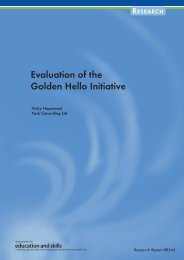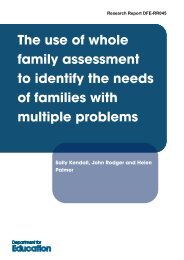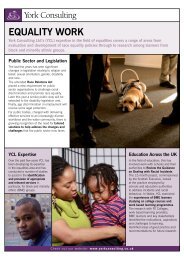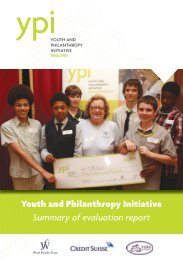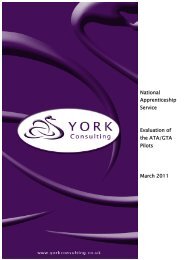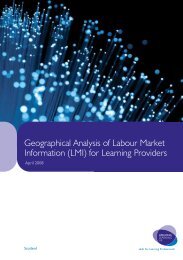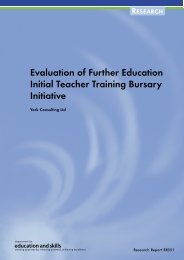Recruitment and Retention in the Post-16 Learning and Skills Sector
Recruitment and Retention in the Post-16 Learning and Skills Sector
Recruitment and Retention in the Post-16 Learning and Skills Sector
Create successful ePaper yourself
Turn your PDF publications into a flip-book with our unique Google optimized e-Paper software.
• lack of adm<strong>in</strong>istrative support. Many respondents feel that <strong>the</strong>yhave less time to concentrate on <strong>the</strong>ir primary teach<strong>in</strong>g role. Onefactor identified as not help<strong>in</strong>g <strong>in</strong> this situation is a lack ofadm<strong>in</strong>istrative support with teachers/tra<strong>in</strong>ers hav<strong>in</strong>g to bear thisburden: “our adm<strong>in</strong> support is down to noth<strong>in</strong>g because, of course,<strong>the</strong> assumption is nowadays that as soon as you're given acomputer is that you're an expert typist, isn’t it? So once you’vegiven everybody a computer you can get rid of <strong>the</strong> secretarial <strong>and</strong>adm<strong>in</strong> support”. [Work Based Learn<strong>in</strong>g];• emphasis on targets. Some concerns were raised regard<strong>in</strong>g <strong>the</strong>target driven nature of education which can contribute to <strong>in</strong>creasedbureaucracy: “our fund<strong>in</strong>g is based on <strong>the</strong> number of students <strong>and</strong>its all to do with reta<strong>in</strong><strong>in</strong>g students … my personal op<strong>in</strong>ion is that, if<strong>the</strong>y are not prepared to work <strong>the</strong>n <strong>the</strong>y shouldn’t be here. But ifwe get rid of <strong>the</strong>m … we lose fund<strong>in</strong>g”. [Fur<strong>the</strong>r Education];• management issues. There are some concerns that managementroles are becom<strong>in</strong>g too far removed from teach<strong>in</strong>g, with educationjust seen as a bus<strong>in</strong>ess: “I appreciate <strong>the</strong> necessity for <strong>in</strong>formationmanagement systems for various forms of analysis but sometimes<strong>the</strong>re's clearly now an echelon <strong>in</strong> education that of build<strong>in</strong>g careerson bureaucracy <strong>and</strong> really that’s not what education’s about, itsabout help<strong>in</strong>g people”. [Fur<strong>the</strong>r Education];• perception of fall<strong>in</strong>g educational st<strong>and</strong>ards. There is aperception that an <strong>in</strong>creas<strong>in</strong>g number of enrolled students lack <strong>the</strong>key skills that teachers/tra<strong>in</strong>ers feel should have been taught <strong>in</strong>schools. Fur<strong>the</strong>rmore, <strong>the</strong> academic requirements for courses areperceived to be fall<strong>in</strong>g. These two factors mean that someteachers/tra<strong>in</strong>ers <strong>in</strong> <strong>the</strong> post-<strong>16</strong> sector are spend<strong>in</strong>g more lessontime teach<strong>in</strong>g key skills ra<strong>the</strong>r than concentrat<strong>in</strong>g on <strong>the</strong>ir particularsubject area: “I do less eng<strong>in</strong>eer<strong>in</strong>g work <strong>and</strong> <strong>in</strong> depth eng<strong>in</strong>eer<strong>in</strong>gwork now, I spend more time do<strong>in</strong>g th<strong>in</strong>gs like key skills <strong>and</strong>develop<strong>in</strong>g education as opposed to actually deal<strong>in</strong>g with <strong>the</strong> nittygritty of what I was really employed for <strong>in</strong> <strong>the</strong> first place”. [WorkBased Learn<strong>in</strong>g].7.23 Interest<strong>in</strong>gly, pay was not identified as <strong>the</strong> ma<strong>in</strong> drawback both <strong>in</strong> <strong>the</strong>quantitative <strong>and</strong> qualitative research. Instead major issues are related toexcessive workload <strong>and</strong> bureaucracy.7.24 Qualitative f<strong>in</strong>d<strong>in</strong>gs identified a difference <strong>in</strong> <strong>the</strong> experiences of thosework<strong>in</strong>g full-time <strong>and</strong> those work<strong>in</strong>g part-time or on a sessional basis.Those work<strong>in</strong>g part-time perceive that <strong>the</strong>y have less support from <strong>the</strong>iremployer, less access to tra<strong>in</strong><strong>in</strong>g <strong>and</strong> development <strong>and</strong> have concernsregard<strong>in</strong>g <strong>the</strong>ir tenure of position.71



